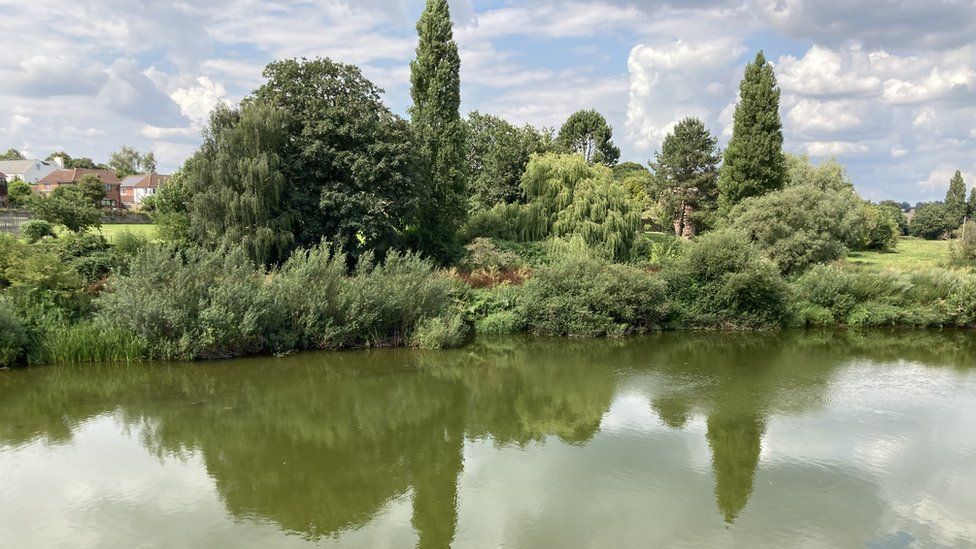
By Ione Wells & Sam Francis
BBC Politics
EU-era water pollution restrictions for housing developments are to be scrapped in a bid to build more homes, the government has announced.
Up to 100,000 new homes could be built by 2030 if rules around building houses near waterways in protected areas are loosened, the government said.
Ministers argue water pollution from new homes is “very small” and will be offset by £280m of investment.
Labour said the government “are failing on both housing and the environment”.
The change will lead to “lots more poo in our rivers” and “not solve root causes of housing problem,” Wildlife TrustCEO Craig Bennett said.
Mr Bennet accused the government of “disgusting behaviour” and “repeatedly” lying to the public over its plans to protect UK waterways.
Natural England rules mean 62 local authorities cannot allow new developments unless builders can prove their projects are “nutrient neutral” in protected areas, including Somerset, Norfolk, Teesside, Kent, Wiltshire and the Solent.
The government have announced plans to scrap these rules through an amendment, or change, to the Levelling Up and Regeneration Bill, currently going through the House of Lords.
By removing the restrictions, developers will deliver an extra £18bn in economic activity, the government said.
Alongside the move the government is announcing new environmental measures including doubling investment to £280m for the Nutrient Mitigation Scheme run by Natural England.
The new environmental measures will mostly target farming and water companies to restore protected waterways. An extra £166m in grants will be made available to farmers for improved slurry storage to reducing nutrient run off into rivers and wetland.
The government said it is also working on new laws expected to “drive significant investment” from water companies to upgrade wastewater treatment works.
What is nutrient neutrality?
A project is “nutrient neutral” if it can prove it will not add extra nutrients to the surrounding water.
While nutrients may sound healthy, flooding an area with substances such as phosphates and nitrates can reduce the quality of water, harm wildlife and cause excess algae growth.
The nutrient neutral rules have been in place since 2019 following a ruling by the European Court of Justice.
In protected areas across England, developers must prove they will not cause any nutrients to seep into nearby water for new building projects to be granted nutrient neutral status before they can begin building – rather than allowing builders to mitigate the impact of their work across multiple developments.
Research by the Environmental Audit Committee in Parliament found agricultural pollution is “the most common factor” for ecological damage in the UK’s rivers and other water bodies.
But housing developments can also pose a risk due the wastewater and sewage that can come from new homes – as well as the run-off from construction sites.
‘Tackle causes of pollution’
Prime Minister Rishi Sunak said a “disproportionate and poorly targeted old EU ruling” had blocked thousands of homes being built in the UK.
“Thankfully we can now reverse that, and alongside that we are investing hundreds of millions of pounds to continue protecting and enhancing our precious natural environment,” he said.
Environment Secretary Thérèse Coffey said: “These new plans will cut nutrients and help support England’s precious habitats whilst unlocking the new homes that local communities need.
“We are going to tackle the key causes of nutrients at source.”
Labour’s shadow housing secretary Lisa Nandy said: “With housebuilding projected to fall to the lowest level since World War II and our rivers full of sewage, the Conservatives are failing on both housing and the environment.”
And Lib Dem leader Sir Ed Davey said “our rivers and our seas need more protection, not less”.
Speaking on a campaigning visit to Mid Bedfordshire, Sir Ed said: “We’ve got a real sewage issue in many rivers across our country… we have to put the environment as a priority above the Conservatives’ ideological issues.”
The Wildlife Trust’s Mr Bennett told BBC Radio 4’s Today programme the nutrient neutral rules are “very modest” as they “require the housebuilders not to cut pollution, but just to stop it getting worse”.
“Unfortunately, the housebuilders have been adept over many years at wriggling out of their environmental commitments and they’ve succeeded yet again,” Mr Bennett added.
Clean rivers campaigner Feargal Sharkey has described the government’s scrapping of pollution rules as “a complete and utter shambles”.
Speaking to Radio 4’s the World at One, Mr Sharkey said “the environment has now been left to fend for itself”.
“If we cannot protect the most sensitive sites in the country,” he asked: “what chances are for any other river for any other forest or any other stream in this nation?”
Developers have claimed nutrient neutrality rules prevented thousands of homes from being built, and welcomed the new ruling.
Executive Chairman of the Home Builders Federation, Stewart Baseley, said housebuilding had been blocked “despite wide acknowledgement that occupants of new homes are responsible for only a tiny fraction of the wastewater finding its ways into rivers and streams”.
Water pollution became a highly politicised issue over the summer, with the Liberal Democrats accusing water firms in England and Wales of failing to reveal how much sewage was being pumped into rivers, lakes and coastlines.
Industry body Water UK called the claim “fabricated and completely false”, saying firms were fixing the problem.








